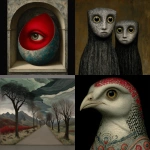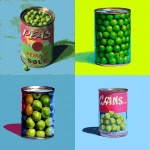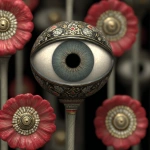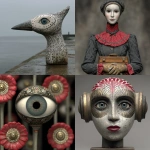Explore the Best AI Image Gallery

The Algorithmic Muse: Navigating the Ethics of AI-Generated Media
Artificial intelligence (AI) is rapidly transforming various aspects of our lives, and the creative industry is no exception. From generating stunning visuals to composing captivating music, AI-powered tools are blurring the lines between human and machine creativity. This surge in AI-generated media presents both exciting opportunities and complex ethical dilemmas that demand careful consideration.
The Creative Potential of AI
AI algorithms can analyze vast datasets of existing creative works, identifying patterns and trends to generate new content. This opens up a world of possibilities for artists, designers, and content creators:
- Democratization of Creativity: AI tools can empower individuals with limited technical skills to create professional-quality content, fostering greater inclusivity in the creative process.
- Enhanced Efficiency: AI can automate repetitive tasks, allowing creatives to focus on higher-level conceptualization and ideation.
- Exploration of New Frontiers: AI can generate unique and unconventional ideas, pushing the boundaries of artistic expression and innovation.
Ethical Considerations: A Delicate Balance
While the potential benefits are undeniable, the rise of AI-generated media also raises several ethical concerns:
- Copyright and Ownership: Who owns the copyright to AI-generated content? Is it the creator of the algorithm, the user who prompts the AI, or the AI itself?
- Bias and Discrimination: AI algorithms are trained on existing data, which may contain biases that perpetuate harmful stereotypes and discrimination in the generated content.
- Authenticity and Transparency: The increasing use of AI-generated media raises questions about authenticity and transparency. It becomes crucial to clearly distinguish between human-created and AI-generated content to maintain trust and accountability.
- Job displacement: The automation capabilities of AI could potentially lead to job losses in creative fields, requiring careful consideration of reskilling and workforce adaptation.
Navigating the Future: Responsible Innovation
As AI continues to evolve, it is imperative to establish ethical guidelines and regulations that govern its use in media creation. This involves:
- Promoting Transparency and Disclosure:** Clearly labeling AI-generated content to ensure consumers are aware of its origins.
- Addressing Bias in Algorithms:** Continuously evaluating and mitigating bias in AI training datasets to promote fairness and inclusivity. \n
- Fostering Collaboration:** Encouraging open dialogue and collaboration between AI developers, artists, ethicists, and policymakers to shape responsible innovation.
- **Education and Awareness:** Raising public awareness about the capabilities and limitations of AI-generated media to foster informed decision-making.
The convergence of AI and creativity presents both immense opportunities and complex challenges. By embracing ethical principles, promoting transparency, and fostering collaboration, we can harness the power of AI to unlock new frontiers in creative expression while safeguarding the integrity and authenticity of human artistry.


















](https://images.ai-img.art/thumbnails/150/6a577517a359cd2bc6212d6b0f12c7cab660841317023550a76c84f409c7f2d0.webp)










](https://images.ai-img.art/thumbnails/150/45237dfa7845159b860f9e234c48c4418e8efcb52b4d15da4493f46e6a99f337.webp)



](https://images.ai-img.art/thumbnails/150/1b14bd827b740aca3b0d8efa7ed6865e28c7c8382172f3f565c96b6c5f64ca78.webp)





](https://images.ai-img.art/thumbnails/150/065f0b2e150f4cc43a9da80d822e8a385e9e50f2f6ff2cc3be7639cfd74952da.webp)




](https://images.ai-img.art/thumbnails/150/6a9bb97a3f1c45ab616724cc54bca010cbcc2d658a9c0e4581aa181c88046444.webp)




